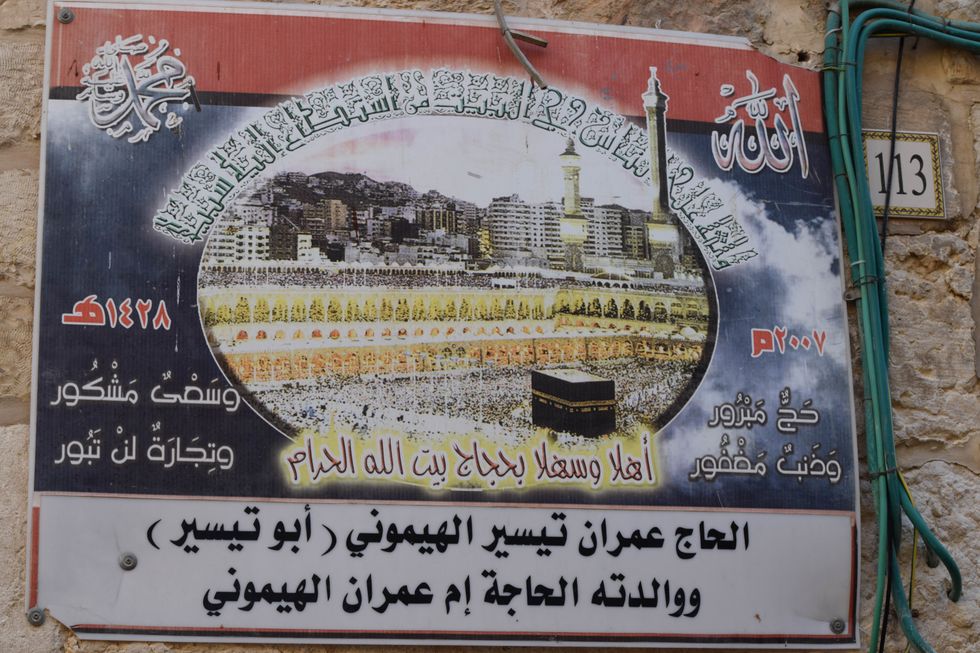On Sunday, we went to the West Bank. Our guide was an Arab-Israeli by the name of Josh Koonin; he led our group into the West Bank because he knew he looked Arab enough that he would be allowed through the checkpoints.
At first, I was rubbed the wrong way about the checkpoints. However, when Koonin explained that the checkpoints are really there for everyone's safety, I understood a little better; people who looked too Jewish might not be welcomed in the West Bank, given the history of wars and illegal settlements, so the border is there to protect both Palestinians from Israelis and Israelis from Palestinians. It's a very sad way to think about it, but I can't think of a better way, either.
In general, I felt pretty helpless about the situation. We drove along the wall (and I'll get into the different names for the wall in a second), and I could help but feel caught between a rock and a hard place. My heart--my emotional side--wished everyone could live in peace together. It was a very Yariv Opphenheimer outlook: optimistic, hopeful, believing in the goodness of humanity and its ability to overpower decades of hate and fear. My brain--the logic part of me--said that the wall was the best thing to keep both sides safe and alive.
Somewhere in between these sides, I wished that there could be a better solution to surface soon, though most people we talked to who actually live in Israel and Palestine said that a long-term solution would not appear in their lifetimes--which meant it probably wouldn't appear in mine either. I get that the wall keeps people safe, but at what cost? The prevention of contact with the other side?
If you can't tell, I think about this a lot, and I never come to a good conclusion--besides the fact that we should hold nothing but empathy, hope, and love in our hearts. And as soon as I say that, my brain immediately tells me that I'm just a naive child if I actually think that's possible. Hmm. I am going through a lot of chaotic emotions while writing this… right now. This seems to happen a lot while I'm writing about my trip: one tangent leads to another, and another, and another.
I learned on this trip that there was so much more to learn--that as an American, I am incredibly uninformed of the reality on the ground. I also learned that many think it's not my place to be all up in their business--which is understandable. I, someone who is not directly, physically affected by this conflict, should mind my own business because there are enough problems to solve on my doorstep.
Why should I be interested in the rest of the world, then? I think it's the hope and resilience that fascinates me about this region and this conflict, but beyond just the surface level, there are humans living an everyday life and burdened by everything that surrounds them.
Yes, there is pain and hurt on every side. Yes, it makes me cry. I realize it is incredibly privileged of me to be able to say this, as an outsider looking in. I come from such a vantage point of privilege--to be able to empathize greatly but at the end of the day go home to a safe dorm room, where my identity is not being questioned by a different side's identity.
Sometimes I feel lost on where I should stand on this conflict because I did myself into the above rabbit hole you just read, but most of the time I remind myself: I know that I will not stand for anything besides humanity. It's not pro-Palestinian; it's not pro-Israeli. It's not pro-Arab or pro-Muslim, and it's not pro-Jewish either. We should all be pro-human. What that actually looks like varies depending on who you talk to, but almost every narrative I heard on this trip boils down to being pro-human.
But of course, what I think about the conflict will not affect the outcome of what happens over in Israel and Palestine. One student, one group of Berkeley kids coming to learn about it--coming to hear a million different viewpoints about a million different nuances we have never thought to consider--that isn't going to change how Netanyahu decides to control the border, or how the Palestinian Authority decides to go about negotiations, or how Hamas decides to further their agenda.
What will be affected by this trip, though, is our own narratives. Our own perspectives (to reference the name of the trip). Another speaker who I will talk about more later told our group that the way Berkeley's student government decides to "condemn Israel's actions of illegal settlements in the West Bank" doesn't define or change the reality in the West Bank, but it does change AND define the reality of Berkeley's student government.
How we conduct our everyday business back home--whether that be discussing what we learned on the trip or just empathizing with someone we might not have before--that's the tangible changes we take out of this experience. That can change who we are, how we interact with people, and how we are seen by others.
Alright, I promise I will actually talk about Ramallah and the West Bank in the next section--and the many names given to the wall! See you then!
- How to Run a Pop-Up Art Show ›
- What happens in Israel is America's business and responsibility ›
- Breaking, Raking, Shaking ›
- Isreali US Embassy Moved To Jerusalem, A City Claimed By Both ... ›
- Sociolinguistics Series: Part 37 ›
- Everything Beginners Need To Know About Arab Weddings ›



















